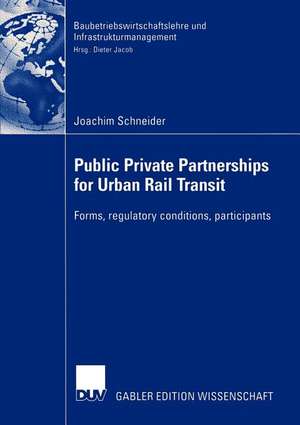Public Private Partnership for Urban Rail Transit: Forms, regulatory conditions, participants: Baubetriebswirtschaftslehre und Infrastrukturmanagement
Autor Joachim Schneideren Limba Engleză Paperback – 29 apr 2004
Din seria Baubetriebswirtschaftslehre und Infrastrukturmanagement
- 15%
 Preț: 439.56 lei
Preț: 439.56 lei - 15%
 Preț: 470.06 lei
Preț: 470.06 lei -
 Preț: 383.93 lei
Preț: 383.93 lei -
 Preț: 451.48 lei
Preț: 451.48 lei -
 Preț: 451.65 lei
Preț: 451.65 lei -
 Preț: 416.34 lei
Preț: 416.34 lei -
 Preț: 481.97 lei
Preț: 481.97 lei - 15%
 Preț: 528.48 lei
Preț: 528.48 lei - 15%
 Preț: 493.70 lei
Preț: 493.70 lei -
 Preț: 415.77 lei
Preț: 415.77 lei - 15%
 Preț: 450.16 lei
Preț: 450.16 lei - 15%
 Preț: 640.85 lei
Preț: 640.85 lei -
 Preț: 452.62 lei
Preț: 452.62 lei -
 Preț: 448.76 lei
Preț: 448.76 lei -
 Preț: 490.25 lei
Preț: 490.25 lei -
 Preț: 453.21 lei
Preț: 453.21 lei - 15%
 Preț: 439.24 lei
Preț: 439.24 lei - 15%
 Preț: 492.08 lei
Preț: 492.08 lei -
 Preț: 483.55 lei
Preț: 483.55 lei - 15%
 Preț: 436.60 lei
Preț: 436.60 lei
Preț: 646.75 lei
Preț vechi: 760.88 lei
-15% Nou
Puncte Express: 970
Preț estimativ în valută:
123.76€ • 132.34$ • 103.18£
123.76€ • 132.34$ • 103.18£
Carte tipărită la comandă
Livrare economică 18 aprilie-02 mai
Preluare comenzi: 021 569.72.76
Specificații
ISBN-13: 9783824480500
ISBN-10: 3824480506
Pagini: 504
Ilustrații: XXI, 485 p. 88 illus.
Dimensiuni: 148 x 210 x 26 mm
Greutate: 0.59 kg
Ediția:Softcover reprint of the original 1st ed. 2004
Editura: Deutscher Universitätsverlag
Colecția Deutscher Universitätsverlag
Seria Baubetriebswirtschaftslehre und Infrastrukturmanagement
Locul publicării:Wiesbaden, Germany
ISBN-10: 3824480506
Pagini: 504
Ilustrații: XXI, 485 p. 88 illus.
Dimensiuni: 148 x 210 x 26 mm
Greutate: 0.59 kg
Ediția:Softcover reprint of the original 1st ed. 2004
Editura: Deutscher Universitätsverlag
Colecția Deutscher Universitätsverlag
Seria Baubetriebswirtschaftslehre und Infrastrukturmanagement
Locul publicării:Wiesbaden, Germany
Public țintă
ResearchCuprins
Urban Rail-transit in the USPublic funding and private contributionTransit development, infrastructure funding, urban and real estate development and perspectives of public-private partnerships'Turnkey'-projectsTransit Joint Development (TJD)Transit-oriented Development (TOD)
Notă biografică
Dr. Joachim Schneider promovierte bei Prof. Dr. Prof. Dr.-Ing. Dipl.-Kfm. Dieter Jacob am Lehrstuhl für Baubetriebslehre der Technischen Universität Bergakademie Freiberg. Er arbeitet als abgeordneter nationaler Sachverständiger in der Abteilung Transeuropäische Verkehrsnetze bei der Europäischen Kommission in Brüssel.
Textul de pe ultima copertă
As a result of longlasting budgetary problems, public investments are gradually diminishing. This lack of public investments on the local, national and supranational level endangers economic development, especially in the transport field. Public Private Partnerships (PPP) have been advocated as a means to overcome this dead end, but the results were not always satisfactory.
Based on a broad definition of PPP, Joachim Schneider investigates the development of urban and regional rail transport infrastructure in the US and the UK and asks the following questions: Which forms of public private co-operation exist? Which are of particular interest from a German and European perspective? Which legal and organisational conditions as well as budgetary, subsidy- and procurement-rules have contributed to positive or negative results? The author shows that the most relevant examples in the USA involve private real estate developers handling urban development projects around urban and regional rail stops. The most promising examples in the UK are privately built and operated Light Rail systems. In order to successfully transfer and implement this experience, it is crucial to create an adequate institutional frame and to foster a culture of co-operation between the public and the private sector.
Based on a broad definition of PPP, Joachim Schneider investigates the development of urban and regional rail transport infrastructure in the US and the UK and asks the following questions: Which forms of public private co-operation exist? Which are of particular interest from a German and European perspective? Which legal and organisational conditions as well as budgetary, subsidy- and procurement-rules have contributed to positive or negative results? The author shows that the most relevant examples in the USA involve private real estate developers handling urban development projects around urban and regional rail stops. The most promising examples in the UK are privately built and operated Light Rail systems. In order to successfully transfer and implement this experience, it is crucial to create an adequate institutional frame and to foster a culture of co-operation between the public and the private sector.













